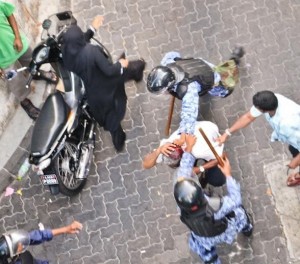Five cases involving four police officers accused of committing acts of brutality in February 2012 are ongoing at the Criminal Court, Attorney General Mohamed Anil informed parliament today.
At minister’s question time, opposition Maldivian Democratic Party (MDP) MP Eva Abdulla asked how far investigations into police brutality – as recommended by the 2012 Commission of National Inquiry’s (CoNI) – had progressed.
“With respect to the administration of justice, in particular concerning allegations of police brutality and acts of intimidation, there is an urgent need for investigations to proceed and to be brought to public knowledge with perpetrators held to account and appropriately sanctioned,” read the second recommendation of the report.
While it concluded that the transfer of presidential power was constitutional, CoNI had found that “there were acts of police brutality on 6, 7 and 8 February 2012 that must be investigated and pursued further by the relevant authorities.”
Anil explained that the Police Integrity Commission (PIC) had investigated 45 cases of alleged police brutality and made a recommendation to the home ministry to dismiss six police officers.
After the ministry instructed police to take disciplinary action against the officers, the police disciplinary board investigated the cases and sacked one officer.
However, the disciplinary board decided there was insufficient evidence to prove wrongdoing by the other five officers and decided not to dismiss them pending the outcome of a trial.
Four of the accused officers were nonetheless removed from “front line” duty and transferred to different departments, noted the attorney general.
The PIC had also submitted cases involving six police officers to the Prosecutor General’s (PG) Office to press assault charges, he continued.
Of the cases filed at the Criminal Court by the PG’s Office, Anil said one case had been concluded and has since been appealed at the High Court.
Moreover, he added, cases involving three other officers were sent back to the PIC due to incomplete information with instructions for resubmission.
The PG’s Office also decided not to prosecute three police officers accused of obeying “unlawful orders,” Anil noted.
Of the 45 cases investigated by the PIC, the attorney general explained that the commission decided there was no evidence concerning 14 complaints, while there was insufficient evidence to identify the officers responsible for 11 acts of brutality.
The remaining cases involved procedural violations, he added, concerning which the PIC recommended strengthening institutional mechanisms.
Following the recommendation to the home ministry, Anil said efforts were undertaken to familiarise police officers with laws and regulations as well as to strengthen ethical training, while further courses were formulated and conducted.
Police brutality
 On February 8, 2012, thousands of MDP supporters took to the streets of Malé in a protest march after former President Mohamed Nasheed declared his resignation the previous day had come “under duress” in a “coup d’etat” instigated by mutinying police officers of the Special Operations (SO).
On February 8, 2012, thousands of MDP supporters took to the streets of Malé in a protest march after former President Mohamed Nasheed declared his resignation the previous day had come “under duress” in a “coup d’etat” instigated by mutinying police officers of the Special Operations (SO).
Following an investigation, the Human Rights Commission of Maldives (HRCM) concluded that the heavy-handed police crackdown on the MDP walk was “brutal” and “without warning.”
The HRCM recommended investigations by the PIC into the “disproportionate” use of force that left dozens of demonstrators injured and hospitalised.
In May 2013, the PG’s Office pressed charges against two police officers accused of assaulting MDP MPs ‘Reeko’ Moosa Manik and Mariya Ahmed Didi during the violent crackdown.
Amnesty International meanwhile warned that failure to prosecute police officers accused of human rights abuses and “serious failings in the justice system entrenched impunity”.
In June 2013, former PIC member Hala Hameed told parliament’s government oversight committee that the cases involving the six police officers were “not disciplinary issues, but crimes,” expressing concern with the home minister’s refusal to suspend the officers.
Moreover, former PIC Chair Shahinda Ismail told Minivan News in September 2012 that a staff sergeant caught on tape kicking a fallen demonstrator “was promoted after this incident.”
In February this year, Shahinda told Minivan News that detainees arrested in Addu City on February 9 were “forced to walk on smoldering coals”.
According to the HRCM report, 32 people filed complaints concerning varying degrees of injuries sustained in the crackdown, while 20 people submitted medical documents of their treatment of injuries.
Two fingers on the left hand of one demonstrator were crushed, the report noted.
Al Jazeera filmed parts of the crackdown, reporting that “police and military charged, beating demonstrators as they ran – women, the elderly, [with] dozens left nursing their wounds”. The BBC meanwhile reported “a baton charge by police on crowds gathered outside one of the main hospitals.”
In a report in May 2013, the UN Special Rapporteur for Independence of Judges and Lawyers Gabriela Knaul warned that there could be more instability and unrest unless serious human rights violations of Maldives’ authoritarian past are addressed.